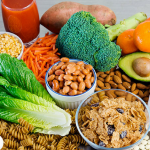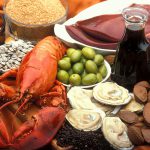However, pregnant women are encouraged to increase their daily calorie intake by up to 300 calories.
Remember that taking supplements is common practice among pregnant women, and has many benefits, but it is important to first consult your physician, as taking certain vitamins in excess can lead to toxicities and harmful complications.
Now that that’s out of the way, what is the best diet to maintain during pregnancy? Of course, you still need all 5 food groups, but here are the 4 nutrients that are must-haves for a healthy pregnancy, as well as some tips on how to organize your meals.
Folic Acid/Folate

This nutrient is of utmost importance, especially during the first trimester. It is responsible for the development of your baby’s brain and spinal cord.
Folate is abundant in leafy green vegetables, fortified or enriched cereals, breads and pastas, beans, and citrus fruits. So you can indulge in all kinds of salads to your heart’s content. Many women take this as a supplement to make sure they meet the demand, and so you should consult your physician regarding the proper amount.
Calcium
Calcium is important to maintain strong bones and to help sustain healthy hair, nails, and teeth.
Good sources are dairy products of all kinds, calcium-fortified juices and foods, sardines or salmon, and dark leafy greens such as kale and spinach.
If you’re a milk-lover, it is preferred that you drink skimmed or 1% milk, instead of full-fat milk.
Take note that some types of fish such as white tuna contain high levels of mercury, which should be avoided during pregnancy, as it is harmful to your baby’s development.
Iron
Iron is largely responsible for carrying oxygen through your body. It’s what your baby uses to breathe. So in some sense, a pregnant woman is “breathing for two”.
As many women are already prone to suffering from anemia, iron deficiency in the blood, it is highly recommended that you double your regular iron intake when pregnant.
Great sources of iron include red meat, poultry, fish, dried beans and peas, iron-fortified cereals, and dark leafy greens like kale, broccoli, and spinach.
Vitamin C also helps the body absorb iron more efficiently, and so a glass of orange juice alongside an iron-rich meal is a great idea.
Protein
Protein is, of course, crucial for the development of the baby’s organs and brain. Especially during the first and third trimesters.
A pregnant woman is advised to have three to four servings of protein per day, equivalent to 40 to 70 grams, depending on her weight and her physician’s suggestion.
If getting the recommended daily amount is a hassle, don’t stress. Just try to get the average amount needed per week. Most people don’t have trouble meeting their average needed amount, as protein can be acquired from many different sources, such as red meat, poultry, fish, dried beans and peas, eggs, nuts, tofu, and some dairy products.
So what IS the perfect diet?
The size of the meal is determined by how much you personally need to get full. In this meal, according to nutrition researchers, you should have:
- Half a plate of fruits and vegetables
- A quarter plate of whole grains
- A quarter of lean proteins
- It is also recommended that you have a dairy product alongside every meal.
